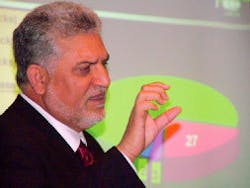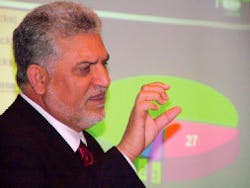POINT OF VIEW: DGH’s Sibal: India keen to attract foreign investment
India’s recent licensing rounds for oil, natural gas, and coalbed methane assets continue to attract international attention, partly due to the efforts of V.K. Sibal. Since assuming the role of director general at India’s Directorate General of Hydrocarbons (DGH) in 2004, Sibal’s efforts have been directed toward attracting investment in the country’s hydrocarbon resources.
Trained as a geoscientist, and now head of the upstream oil regulating authority, Sibal is an enthusiastic champion for Indian oil and gas, noting the promising geological prospectivity and upside potential, yet very low drilling density throughout the country. Sibal points to India’s vibrant democracy, spirit of enterprise, skilled workforce, and rapid economic expansion-with an average 6%/year growth in gross domestic product-as attractive reasons for exploration investment. His aim is sustainable development for India. “The DGH strives to ensure prudent exploration and management of the country’s hydrocarbon energy resources,” he said.
FDI policy
India’s Ministry of Commerce and Industry has a “liberal and transparent” foreign direct investment (FDI) policy, intended to attract foreign capital, technology, and infuse the industry with global best practices. The FDI policy for oil and gas was updated in April. All activities other than refining are permitted up to 100% participation, although those pertaining to trading and marketing of petroleum products must divest 26% equity to the public or an Indian partner within 5 years. Public sector involvement in refining projects is limited to 26%; private companies are permitted up to 100%.
Sibal stressed that the FDI policy is proactively designed to attract international companies to participate in exploration, pipelines, refining, and product marketing in India. About 138 production-sharing contracts have already been signed and represent an estimated investment of more than $4 billion.
The DGH office has paid particular attention to enhancing the recent licensing rounds for traditional oil, gas, and CBM acreage. Sibal has traveled extensively to promote the country’s unexplored assets and increase oil and gas exploration and development. “The DGH’s role will make the difference in the country’s hydrocarbon energy policy and strategy,” he said.
Upstream petroleum is still a knowledge industry, Sibal noted, not a process industry. “We’re aware there is bound to be value addition through global expertise and technology.”
Sibal said the country was facing a shortage of rigs and drilling equipment, but this is a common problem around the world. He would like to see investors come to India and manufacture such equipment, noting the unmet demand and large profits made by others.
NELP rounds
India’s Ministry of Petroleum and Natural Gas established the New Exploration Licensing Policy (NELP) in January 1999. The government is improving the system continuously, Sibal said, with a definite improvement since the pre-NELP period. “Lots of data have been generated” and much is available in an internet-based data repository.
Sibal and a delegation of senior DGH staff visited London, Aberdeen, Calgary, and Houston in 2005 and early 2006 for a series of prerelease meetings with oil companies, including ExxonMobil Corp., Royal Dutch Shell PLC, Chevron Corp., and Apache Corp.
At the DGH offices in New Delhi last November, Sibal told OGJ that the NELP VI round would likely be the last and that the country would probably, in the future, move toward a more transparent open acreage nomination system (OGJ Online, Nov. 16, 2005).
He discussed changes that distinguish the NELP VI round. “Previously, the blocks on offer were too large” to properly explore, ranging in size from 500 sq km to 20,000-30,000 sq km. Smaller onshore blocks were added to NELP VI, as small as 32 sq km.
Of 600 wells committed under previous NELP rounds, only 70 had been drilled as of March. “You can only find oil if you drill,” he said, “so go and drill.” The geologic model evolves with every new well.
“If you want to be knighted in England, drill in India,” referring to Cairn Energy PLC Chief Executive Officer Bill Gammel and the company’s successes in Rajasthan and Gujarat.
In the early NELP-VI period, 77 companies were participating (as of March), an increase from the 55 companies that participated in pre-NELP-V (2005). Ultimately, India received 69 bids from 48 companies, including 27 companies from outside India, for the 20 blocks offered under NELP V (OGJ Online, June 2, 2005).
In the NELP VI round, the government is offering “big, challenging offshore blocks,” particularly along the eastern coast.
Bids for NELP VI will be opened in New Delhi on Sept. 15, and the government intends to complete block assignments and sign PSCs within 4 months.
Coalbed methane
Sibal said that India has the world’s sixth largest resource base for CBM and pointed to the rapidly increasing demand for gas that has created a ready local market.
In CBM-I and CBM-II, 7,800 sq km were offered for CBM exploration, and 16 blocks were awarded. So far, 50 coreholes and 20 pilot wells have been drilled on these blocks.
Ten blocks were offered in the recent CBM-III round and bids were opened on June 30. The government received 54 bids from 18 Indian and 8 foreign companies, reflecting more interest than in the two previous CBM bid rounds (OGJ Online, July 5, 2006).
Terms and conditions for the third CBM round include:
- 7-year tax holiday from the date of commencement of production.
- No government participating interest, up-front payment, or signature bonus required.
- No customs duty on imports required for CBM operations.
- Freedom to sell gas in the domestic market at market-determined rates.
Notable successes
Sibal pointed to the growth of E&P companies that have invested in India, pointing to the achievements of Reliance Industries Ltd., Hindustan Oil Exploration Co. Ltd., Canada’s Niko Resources Ltd., and Cairn Energy.
Sibal is pleased with discoveries in the Krishna-Godavari basin, particularly in the synrift Lower Cretaceous section. Cairn made three deepwater discoveries: Annapurna, Padmavati, and Kanaka Durga. Reliance and Niko made the world’s largest gas discovery in 2002 with the Dhirubhai-1 well.
Gujarat State Petroleum Corp. Ltd., Jubilant Enpro Ltd., and GeoGlobal Resources (India) Inc. drilled four KG basin wells in 2004-06 and discovered reservoirs in shallow water (OGJ Online, June 7, 2006).
India’s state-owned Oil & Natural Gas Corp. also made two deepwater gas discoveries in the KG basin, using the Discoverer Seven Seas drillship in 2005 and the Sagar Vijay drillship in 2003 (OGJ, Apr. 4, 2005, p. 44).
Sibal touts other recent discoveries by private companies and joint ventures, including Cairn’s gas discoveries in the Gulf of Cambay; Niko’s gas wells in the onshore Cambay basin; and the Cairn-ONGC discoveries onshore Rajasthan (OGJ, Jan. 23, 2006, p. 35).
Knowledge sharing
Sibal believes that innovative development comes from making knowledge connections across different disciplines and organizational boundaries. He said that sometimes it is necessary to restructure an organization to enable it to survive and grow in the emerging competitive environment.
One particular interest for Sibal is the formation of “knowledge hubs” in the energy sector, encouraging interaction between industry and academia, and bringing together disparate groups of workers in dispersed locations. The DGH office serves as a government knowledge hub, along with the Energy Institute India, which was formed through the merger of the Institute of Petroleum and Institute of Energy UK. Sibal is a member of the board of the EI-India, along with leaders from Shell, BG E&P Ltd., Tata BP Solar India Ltd., ONGC, BP PLC, BHP Billiton, and others.
Sharing information results in faster and more-efficient use of present knowledge and solutions, rather than requiring competitors to waste resources to “reinvent the wheel.” Integrating experts and sharing knowledge among different disciplines is necessary to develop, innovate, or optimize technologies.
New frontiers
On July 20, the US India Business Council hosted a 16-person delegation led by Sibal at the US Chamber of Congress in Washington, DC, attended by officials with the US Department of Energy.
Sibal is under consideration for the top position at ONGC, the New Kerala online newspaper reported. Candidates are being reviewed by the Public Enterprise Selection Board, which will send recommendations to the government. Former ONGC Chairman and Managing Mirector Subir Raha retired in May (OGJ, Jan. 23, 2006, p. 23).
Career highlights
V.K. Sibal was appointed director general of the Directorate General of Hydrocarbons (DGH) on Nov. 1, 2004. Before joining DGH, he was a director at Oil India Ltd. (OIL), an exploration and production Navratna company of India.
Employment
After a brief stint at Oil & Natural Gas Corp., Sibal joined OIL in 1977 as a geophysicist. He worked in geosciences and information technology, and using his project management skills, gradually rose to assume senior technical positions in the organization, including chief geophysicist and operations general manager. He then became group general manager in July 2003. Sibal was responsible for the entire exploration operations of OIL. His initiatives included induction of world-class, cutting-edge technologies for 2D and 3D seismic data acquisition, processing, and interpretation. Subsequently, he joined OIL’s board as personnel director in September 2003. In this position, his initiatives included competency profiling of senior management and implementation of a three-tiered approach to improving human resources development.
Education, affiliations
Sibal studied geophysics at Punjab University and earned an MS in physics in 1973. He has a postgraduate diploma in human resource management. He serves on the executive committee and is a life member of Association of Exploration Geophysicists, India; a member of Society of Petroleum Geophysicists; and a member of the Society of Exploration Geophysicists. He also is the executive member of PETROFED India and Institute of Petroleum Management in India.

